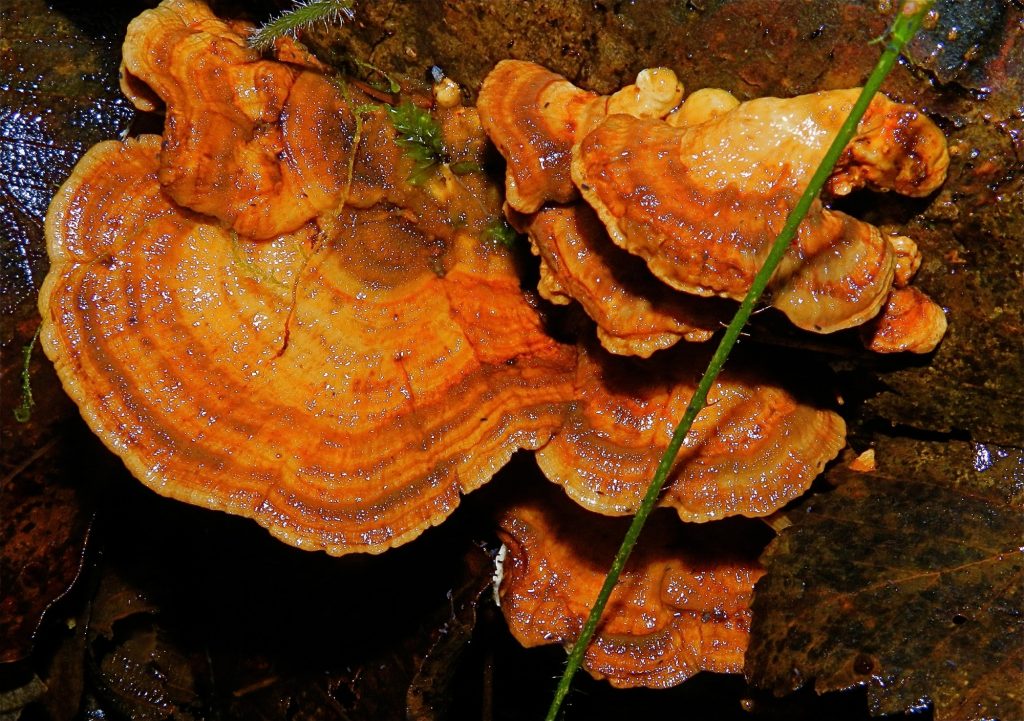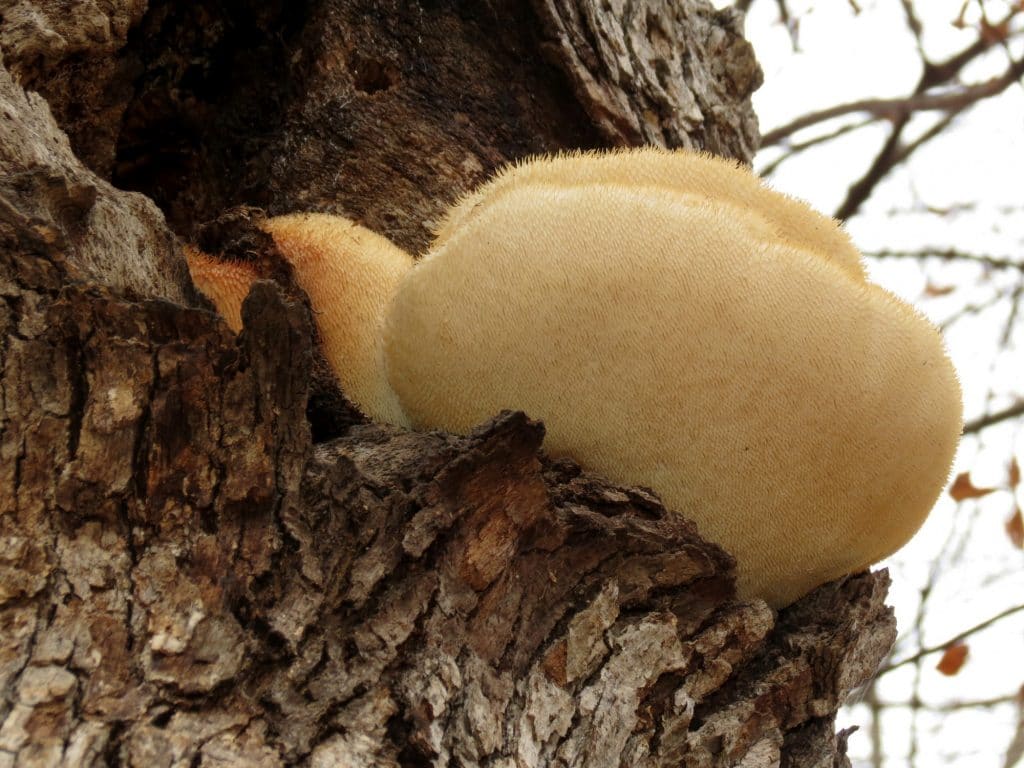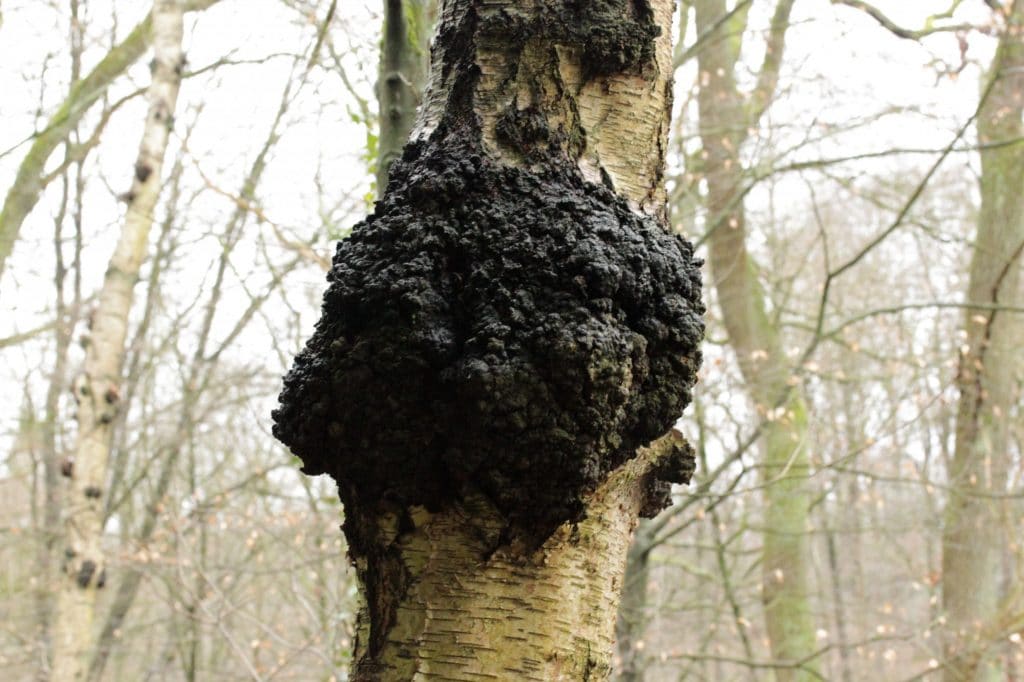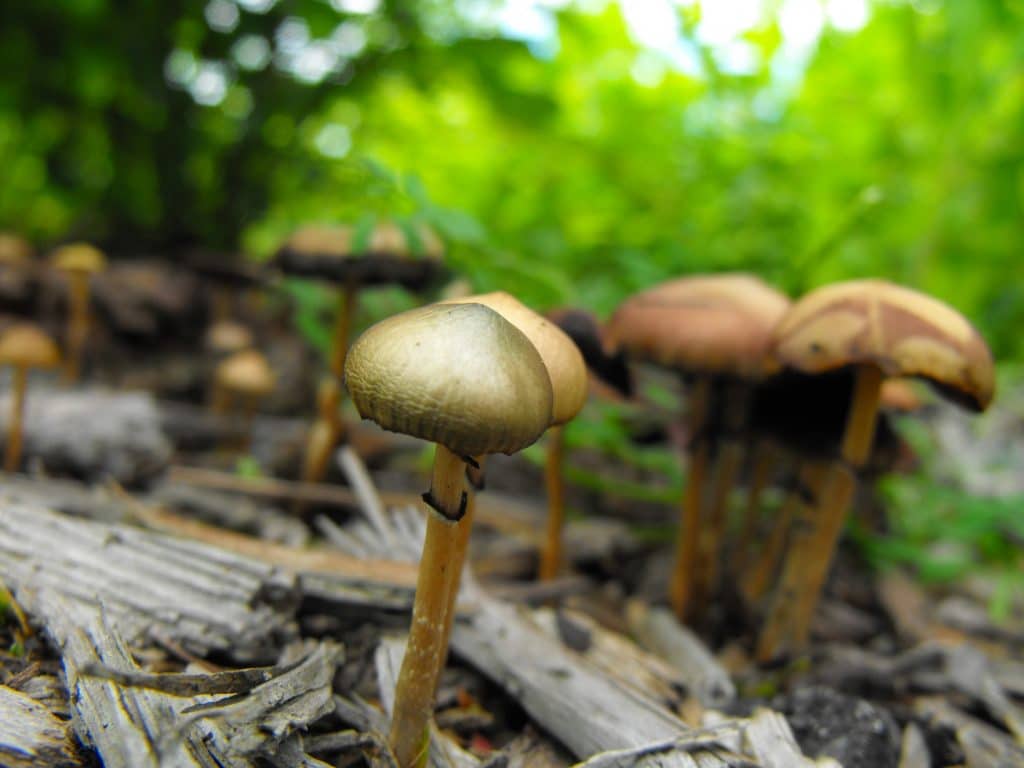Medicinal Mushrooms
Medicinal mushrooms pop up in high-end coffee shops and supermarkets, however, using medicinal mushrooms is nothing new. They’ve been used for thousands of years. The age-old question is: What do medicinal mushrooms do, anyway? The simple answer is a lot.
An Expert Weighs In
Dr. Michele Ross, PhD, MBA, is a self-described “addiction researcher turned plant-medicine advocate.” She’s also a bestselling author, drug policy reform expert, and a worldwide educator to thousands of patients and healthcare professionals. Along with her PhD in neuroscience, Dr. Ross’ expertise is in teaching others how to achieve pain relief naturally with mushrooms, cannabis, and kratom.
Nootropics
Dr. Ross says, “Medicinal mushrooms can act as nootropics.” Nootropics are medical and nutritional compounds that enhance cognitive function. Nicotine, for example, is a nootropic. As are caffeine and ginkgo biloba.
In recent years, preliminary experiments suggest that some mushrooms, like lion’s mane, contain compounds that may stimulate nerve growth in the brain. Albeit, this research hasn’t progressed beyond rodent trials. Dr. Ross, however, can speak from firsthand experience.
“I myself have experienced this rapid brain rewiring after taking mushrooms after brain injury. I literally went from ‘Will I ever be a neuroscientist again?’ to completing an MBA program and writing a 400-page book.”
Penicillin: The Famous Fungal Med
Penicillin, derived from Penicillium mold, is arguably one of the most famous fungal medicines in the world. And, it would be no exaggeration to say that this fungus changed the course of human history. In 1928, Dr. Alexander Flemming accidentally unearthed this cure that continues to save the lives of millions and drastically reduces the spread of infectious disease.
While deleterious to your daily loaf of bread — its usual host — this antibiotic continues to have profound implications on human health. But, Penicillium is far from the only fungus with medicinal value. The relationship between humans and medicinal fungi spans millennia.
Shrooms in History
Mushrooms have been used in traditional medicine for thousands of years. They’re cornerstone figures in Traditional Chinese Medicine (TCM) and appear in the mythical Herbal Classics, the ancient Chinese version of the Materia Medica.
As reported by Vaclav Vetvicka and his colleagues in their review for Molecules, Indian texts dating back 5,000 years highlight the medicinal properties of mushrooms. Likewise, fables from ancient Japan tell tales of cancer-ridden monkeys cured by a feast of shiitake (Lentinula edodes).
Shrooms Now
More recently, mushrooms have become popular supplements and health aids in the West. But, it’s taken decades of experimentation for scientists to understand the healing properties of these humble fungi. Medicinal mushrooms are mushrooms that have therapeutic value in human health.
Today, pharmaceutical medicines, nutraceuticals, or dietary supplements often contain mushrooms or their active constituents. Most commonly, however, they’re brewed into teas, steeped into tinctures, or eaten as foods.
See also: Why You Should Grow Your Own Mushrooms
“In the case of someone with traumatic brain injury, or a chronic disease, taking medicinal mushrooms could bring them back to almost normal cognitive function,” she explains. “In the case of someone that is healthy, medicinal mushrooms can help them perform better and solve really complex problems.”
But what exactly makes mushrooms medicinal? Like their botanical brethren, mushrooms are host to an astounding number of nutritional and bioactive compounds. Vitamins, antioxidants, and aromatic terpenes are among the compounds that give mushrooms their therapeutic potential. Unlike plants, however, mushrooms are home to another secret weapon—complex sugars.
In the age of ketogenic and low-carb diets, sugars are often unwelcome villains and the new “public enemy number one.” But, the complex carbohydrates found in mushrooms paint a very different picture of the role carbohydrates can play in human health.
Medicinal mushrooms produce a special class of polysaccharides called beta-glucans. Beta-glucans are in the cell walls of bacteria, fungi, and even some plants, like oats and barley. These natural chemicals stimulate the immune system, potentially boosting its ability to defend against harmful pathogens and, amazingly, fight cancer cells.
Medicinal Mushrooms and Cancer
Cancer is perhaps the single most important area of medicinal mushroom research. In the last decade, there’s been an uptick in studies that examine the effects of medicinal mushrooms and cancer. However, the research is still in an early phase. Many medicinal mushrooms, such as shiitake and reishi, produce polysaccharides that stimulate the body’s immune cells, including macrophages, T-cells, and natural killer (NK) cells.
Cells Fighting Cancer
These cells are the body’s first line of defense against cancer. When they’re healthy and abundant, they ruthlessly destroy rogue cancer cells. In addition, they patrol for diseased cells, and if they meet one, they secrete nitric oxide and hydrogen peroxide to poison the undesirable. The natural killer cells finish it off by lysing the cancer cell into pieces. (There are no laws of war for the human immune system).
Modern cancer research involves finding ways to enhance this form of innate immunity. For the past decade, researchers worldwide have dedicated their careers to studying novel therapies for cancer. Most recently, non-toxic immunotherapies have earned their rightful place among the most promising areas of cancer research. This includes research on stimulating NK cells to respond to tumors that have already developed in the body.
See also: Beyond Psilocybe Cubensis: 10 Magic Mushroom Species You Should Know About
Glucans
The immunostimulating compounds in some mushrooms provide one potential path in this non-toxic direction; researchers have studied glucans for cancer since the 1960s. And, while glucans alone are not the ideal cancer treatment, experiments are promising. A 2016 clinical trial, for example, found that dietary glucans improved NK cell function in patients recovering from various types of cancer.
But, beta-glucans are far from the only therapeutic compounds in fungi. Some fungi are so efficient at fighting cancer they are part of chemotherapy agents. The pharmaceutical drug paclitaxel, for the treatment of lung, breast, and prostate cancer, is produced naturally by fungi found in the Pacific yew tree.
Yet, paclitaxel comes at a cost. While the toxin can effectively kill cancer, it’s considered a poison in any other circumstance; ingesting any part of a yew can cause severe illness. Or, in the worst-case scenario, it can give you a heart attack.
Which Mushrooms Are Medicinal?
To date, over 700 mushroom species are known to contain bioactive compounds, performing up to 126 distinct medical functions. But, you won’t find all 700 on supermarket shelves or at your posh Los Angeles coffee shop. Instead, a mere handful takes the spotlight. Here’s a list of the most common medicinal mushrooms and what they do:
Reishi (Ganoderma lucidum)

Dubbed the “Mushroom of Immortality,” reishi is a prized specimen in China and Japan. The mushroom boasts over 200 different polysaccharides, along with a wealth of amino acids, terpenoids, and additional common nutrients. Contemporary doctors in China often give this mushroom to cancer patients to strengthen the immune system during rounds of chemotherapy and radiation. In Western scientific practice, this tree-dwelling mushroom is being studied for its roles in cancer, immune support, and sleep.
Turkey Tail (Trametes versicolor)

Trametes versicolor is the star subject of numerous cancer-related studies. Its most notable polysaccharide is polysaccharide krestin (PSK), already in use as an adjunct cancer treatment in Japan. Since the 1970s, extracts from this log-dwelling mushroom are an active ingredient in supplementary treatments for thousands of cancer patients.
Shiitake (Lentinula edodes)

Shiitake mushrooms are one of the easiest species to grow at home, and they also have a long history as a medicine. They were traditionally used to fight the common cold, but emerging research suggests that they may have cholesterol suppressant and anti-tumor potential. The main active constituent in Lentinula edodes is the polysaccharide lentinan, which is already in use as an injectable adjunct immunotherapy for cancer patients in China and Japan.
Lion’s Mane (Hericium erinaceus)

“Lion’s Mane” couldn’t be a more appropriate name. This mushroom features robust white plumage that blooms like a soul patch on hardwood trees. The fungi are most famous for their potential benefits in neurological health. Its two main active compounds are hericenones, and erinacines. Early experiments show these to successfully stimulating the growth of new brain cells.
“Since I also have fibromyalgia and other chronic illnesses that result in symptoms like brain fog, depression, and chronic pain, lion’s mane improves my focus and mental endurance. So, I can solve challenging problems or write for 12 hours at a time without my brain having to crash and reboot!”
Chaga (Inonotus obliquus)

Chaga mushrooms are at risk of being over-harvested in the wild. However, these mushrooms might often miss your first glance; they look a bit like burnt charcoal on the side of birch trees. Like other mushrooms, chaga has potential immune-modulating properties.
Psilocybe

Psilocybes aren’t your typical medicinal mushrooms. These beloved “magic mushrooms”—or shrooms—cause psychoactivity, which may not (officially) heal the body physically or stimulate the immune system (though some anecdotal reports suggest otherwise), but may be valuable on psychological and spiritual levels.
In early clinical trials, psilocybin successfully eases depression and anxiety in terminally-ill cancer patients after a single session. Now, researchers are looking into whether or not the psilocybe experience can have similar success in patients with clinical depression and alcohol dependence.
See also: The Definitive History of Psilocybin
Medicinal Mushroom Benefits
Romans reportedly referred to Mushrooms as the “Food of the Gods.” Now, with the help of modern science, it’s easy to understand why. Not only are mushrooms nutrient-rich, but each species features unique chemical compounds that may promote health and wellness in unusual ways. Here’s a quick summary of some of the most promising medicinal mushroom benefits:
Mushrooms Contain Vitamin D
Mushrooms, along with fatty fish, are among the few natural sources of dietary vitamin D. Vitamin D is essential for a variety of basic bodily functions; it’s crucial for bone health, blood pressure regulation, and nerve function. Normally, humans synthesize vitamin D through the skin after spending time in the sun. Edible mushrooms, however, naturally contain vitamin D. This makes mushrooms particularly good to eat during wintertime. That’s a time when you may not get enough sunlight for your body to synthesize vitamin D properly.
Some Mushrooms produce Vitamin B12
Vitamin B12 is an essential nutrient found mainly in meat. This is unfortunate news for many vegetarians and vegans, who often struggle to get enough of this neuroprotective vitamin in their daily diet. Amazingly, some mushrooms synthesize vitamin B12 on their own. Shiitake, Lion’s Mane, Black Trumpet, and Golden Chanterelle are potential fungal sources of B12. (Although, you’d still need to eat 50 grams a day to meet your recommended daily allowance. So, take your supplements!).
Medicinal Mushrooms for Immune Support
Apart from cancer, medicinal mushrooms offer other support to the immune system. For example, mushrooms may improve the immune system’s ability to fight infection against viral, bacterial, and parasitic pathogens. Somemedicinal mushrooms may also help mediate inflammation and allergic immune responses, but research on the topics is still underway.
Heart Health
While some poisonous mushrooms may give you a heart attack, medicinal mushrooms might just help you lower your cholesterol and improve cardiovascular health. The cardiovascular effects of edible and medicinal mushrooms are a hot topic in mushroom research. Thus far, early studies suggest that some species of edible fungi may reduce the oxidation of lipids in the blood, which, in turn, may harden into a cholesterol plaque that clogs arteries and increases the risk of a heart attack.
Do Medicinal Mushrooms Work?
There is no such thing as a panacea. Medicinal mushrooms are nutritionally rich and feature tremendous therapeutic potential. But mushrooms alone are not a cure-all. Instead, they are a vital part of a healthy diet, lifestyle, and doctor-approved treatment plan. The reason mushrooms are in use as medicine for millennia is the fungi are good for you.
Are Medicinal Mushrooms Safe?
For the most part, medicinal mushrooms are as safe as edible mushrooms. Most medicinal mushrooms are edible mushrooms. The only difference is the preparation, concentration, and intention for consuming them.
Dr. Ross says, “It’s important to remember that there is an appropriate time and place to use mushrooms and that not all mushrooms are right for all patients. Be safe and be educated.”
See also: Shrooms vs. Acid
Tips for Shroom Safety
Here are general tips and tricks for medicinal mushroom safety:
- Avoid eating foraged mushrooms unless they can be properly identified.
- Always take the recommended dose.
- Always consult the guidance of a trusted medical professional before making adjustments to any therapy.
- Make sure you purchase mushrooms or mushroom spores from a reliable source.
Mushrooms and COVID-19
“I think it’s important that people boost their immunity with medicinal mushrooms like astragalus and turkey tail, during the coronavirus pandemic,” says Dr. Ross. “But, several experts, including Paul Stamets and Dr. Andrew Weil, suggest that you might want to stop using them if you get a fever and show symptoms of COVID-19.”
Some mushrooms, she explains, may increase the production of inflammatory compounds in the lungs. These compounds are called cytokines, and the body may release them as a natural response to some polysaccharides found in fungi. (For example, a 2016 study found that some beta-glucans may worsen inflammation in pneumonia.)
If you or a loved one struggles with substance use, contact the Substance Abuse and Mental Health Services Administration (SAMHSA) National Helpline at 1-800-662-4357 for support. If you’re looking for peer support during or after a psychedelic experience, contact Fireside Project by calling or texting 6-2FIRESIDE.
—
Honeysuckle is publishing this article in collaboration with DoubleBlind Magazine.


